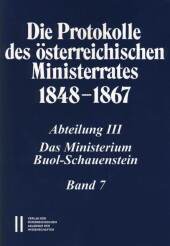 Neuerscheinungen 2015Stand: 2020-02-01 |
Schnellsuche
ISBN/Stichwort/Autor
|
Herderstraße 10
10625 Berlin
Tel.: 030 315 714 16
Fax 030 315 714 14
info@buchspektrum.de |

Institut für Neuzeit- und Zeit, Stefan Malfer
(Beteiligte)
Die Protokolle des österreichischen Ministerrates 1848-1867 Abteilung III: Das Ministerium Buol-Schauenstein Band 7
4.Mai 1858 - 12.Mai 1859
Herausgegeben von Institut für Neuzeit- und Zeitgeschichtsforschung an der Österreichi
2015. LV, 408 S. 23.5 cm
Verlag/Jahr: VERLAG DER ÖSTERREICH. AKADEMIE DER WISSENSCHAFTEN 2015
ISBN: 3-7001-7788-7 (3700177887)
Neue ISBN: 978-3-7001-7788-3 (9783700177883)
Preis und Lieferzeit: Bitte klicken
Volume III/7, Cabinet Buol-Schauenstein, of the edition Die Protokolle des österreichischen Ministerrates 1848-1867 [The Protocols of the Austrian Cabinet 1848-1867] contains 67 minutes from May 4rd, 1858, to May 12th, 1859, and eight extraordinary protocols from January to April, 1859, plus footnotes concerning textual criticism, a thorough scientific commentary as well as an introduction, a bibliography and a detailed index of names, places, subjects.
On May 1st, 1858, part of the "Franz-Joseph-Quai" was opened in Vienna, regarded as a symbol for the modernity of the neoabsolutistic regime. On August 21st the Crown Prince was born to the imperial couple. On November 1st the "Austrian currency" replaced the so called "Konventionsmünze" as means of payment, bringing "order and light into the Austrian coinage". With this change finally the free convertibility between paper money and silver coins went hand in hand.
Incessantly the government was working on reforms. Many were implemented: unitary authorities for mining, laws on army supplement, on communes, on Commodities Exchanges, on trademark and design protection, on proceedings in case of financial failure, on a building code for Vienna in order to promote housing. Other reforms were put under way: direct and indirect taxes, the position of Protestants in Hungary, a regulation for the Jews.
Yet, the pleasant events and the many reforms were misleading. The fundamental problem continued to exist: the missing acceptance of neoabsolutism on the part of important social groups and by two great and rich lands, Hungary and Lombardo-Veneto. The latter turned out to become the test case for the regime. Both Prime Minister Cavour of Piemont and the French Emperor Napoleon III prepared war against Austria. Francis Joseph and his advisors could not nor were they willing to evade this challenge, relying on international law and their army. Starting from April 28th, 1859, the Habsburg Monarchy was at war.
This volume brings together important documents edited according to the scientific state of the art and places them at the disposal of researchers interested in Austrian history as well as for university teaching, and it is an important source for the history of Austria and its neighbours.
Stefan Malfèr ist Historiker bei der Kommission für die Geschichte der Habsburgermonarchie der Österreichischen Akademie der Wissenschaften.


